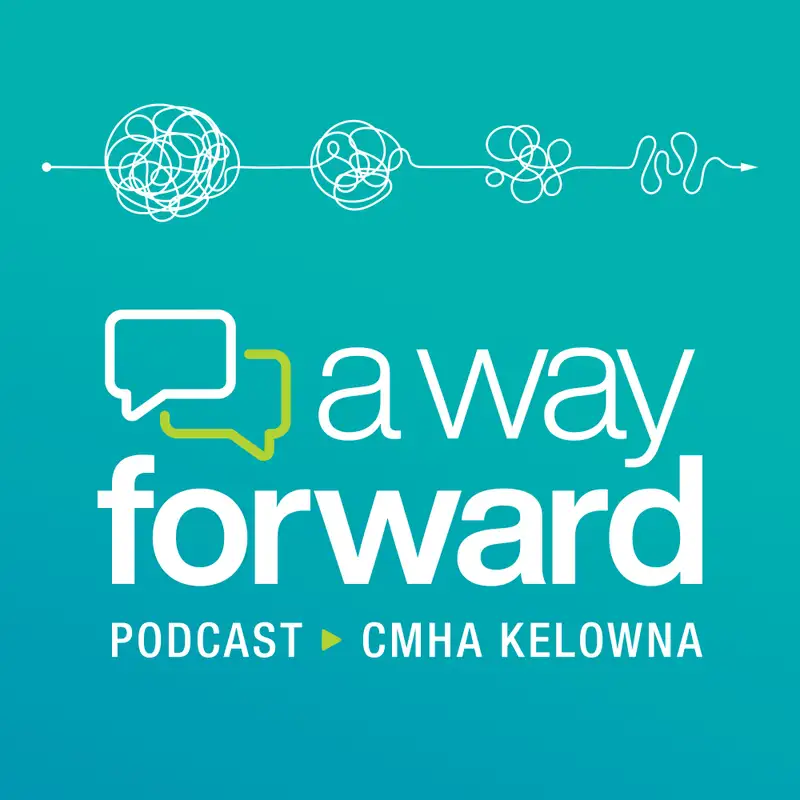Episode 7: Loneliness
In Episode 7 of A Way Forward: Conversations on Mental Health, presented by Beem Credit Union, host Jessica Samuels sits down with CMHA Kelowna CEO, Mike Gawliuk to dive into the topic of loneliness—what it truly means, how it impacts us, and strategies to address it. They explore how loneliness isn’t just about being alone but can also occur within social groups where people feel disconnected. They also discuss its severe physical and mental health consequences, such as heightened risk of heart problems, depression, and even a shortened lifespan.
The episode touches on loneliness in various contexts, including among seniors, Indigenous and LGBTQ+ populations, and the workplace. They also tackle the role of technology in fostering a false sense of connection and the lingering effects of the COVID-19 pandemic on our social lives. Mike emphasizes the importance of addressing loneliness as a societal issue and offers practical solutions, from building real-world connections to organizational strategies for fostering a culture of connection in the workplace.
Key Discussion Points:
- Defining Loneliness:
- Loneliness is more than being alone; it’s an emotional experience tied to unmet needs in relationships.
- People can feel lonely even when surrounded by others if they lack meaningful connections.
- Health Impacts:
- Loneliness has been equated to smoking 15 cigarettes a day in terms of its effect on health.
- Physical consequences include increased blood pressure, heart problems, and a shorter lifespan.
- Mental health risks include anxiety, depression, and a negative impact on overall well-being.
- Groups at Higher Risk:
- Indigenous seniors: Impacted by racism, poverty, and historical oppression.
- LGBTQ+ individuals: More likely to live alone or experience social isolation.
- Workplace environments: Employees may feel lonely despite being physically surrounded by colleagues.
- The Role of Technology:
- Social media and digital interactions can create a perception of connection but often lack depth.
- Comparisons on social media can amplify feelings of isolation and inadequacy.
- Loneliness and the Pandemic:
- COVID-19 amplified loneliness through enforced social isolation.
- The long-term societal impacts are still being studied.
- Workplace Loneliness:
- Returning to the office doesn’t necessarily reduce loneliness.
- Building a culture of connection is essential, including socialization opportunities and understanding employees’ needs.
- Addressing Loneliness Through Connection:
- Strategies for individuals:
- Find community through shared interests or volunteering.
- Reconnect with family and friends beyond digital interactions.
- Strategies for organizations:
- Measure loneliness through surveys to identify and address gaps.
- Foster a culture of connection with meaningful social activities.
- Strategies for individuals:
- Navigating Grief-Related Loneliness:
- Avoid self-imposed expectations about how grief should look.
- Accept support, engage in activities, and avoid prolonged isolation.
- Consider professional counseling for additional support.
Actionable Takeaways:
- For Individuals: Build connections through community activities, shared interests, or volunteering. Avoid relying solely on digital interactions for connection.
- For Organizations: Prioritize creating a workplace culture of connection and measure loneliness among employees to tailor interventions.
- For All: Recognize loneliness as a significant health issue and take proactive steps to support those around you.
**Resources**
**General Mental Health Resources:**
If you or someone you know is struggling, CMHA Kelowna's Find Help Now page has a list of emergency and non-emergency resources for individuals of any age. CMHA Kelowna - Find Help Now

